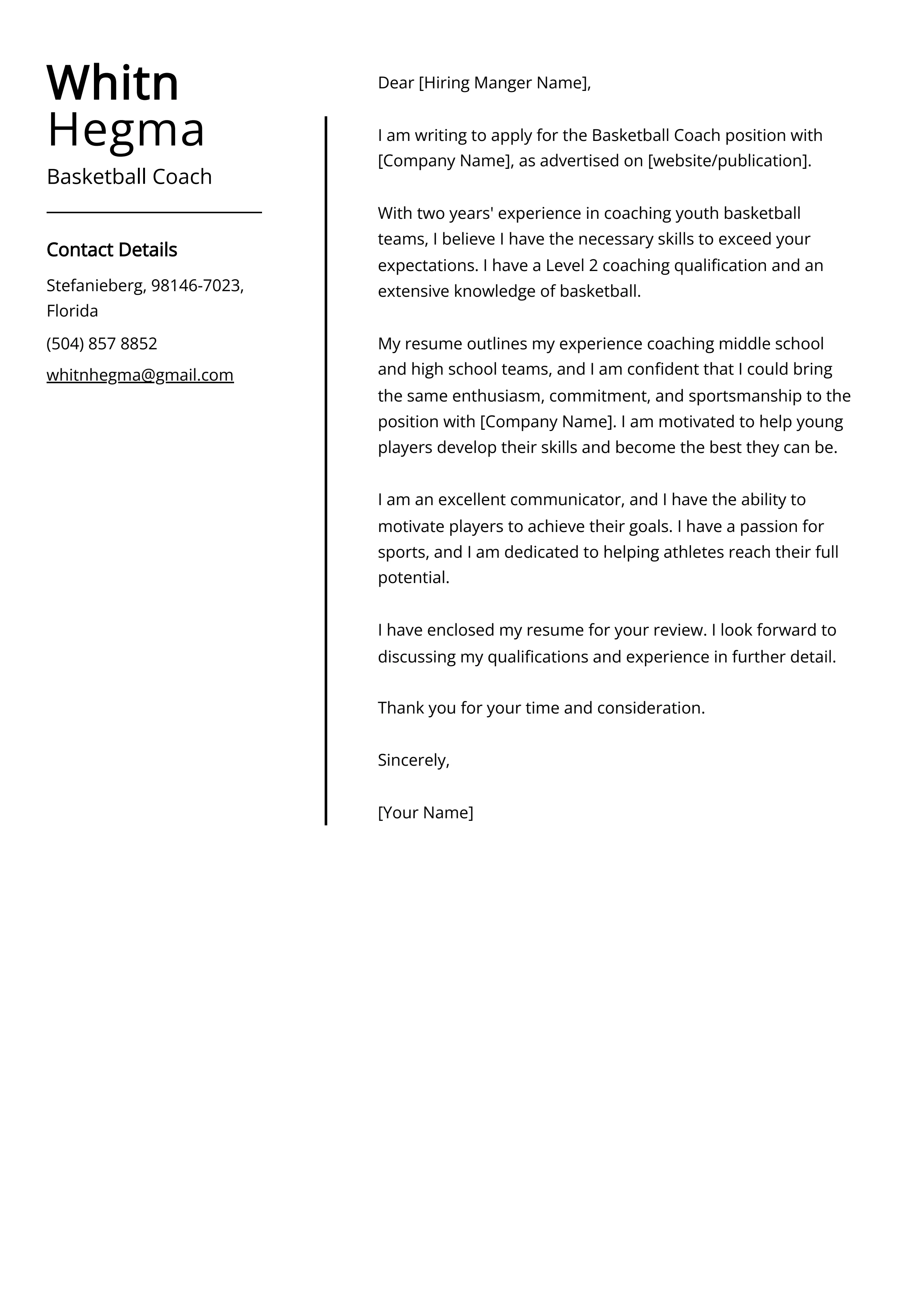Coach Cover Letter How-To Guide
Landing your dream coaching role requires more than just a stellar resume. A well-crafted coach cover letter is your opportunity to showcase your personality, passion, and qualifications in a way that a resume alone cannot. It’s your chance to make a strong first impression and convince the hiring manager that you’re the perfect fit for the position. This comprehensive guide will walk you through every step of writing a compelling coach cover letter, from understanding its purpose to providing a practical example that you can adapt for your own job applications. By following these guidelines, you’ll increase your chances of standing out from the competition and securing an interview for your desired coaching position. Remember that a great cover letter is a key to unlocking your coaching career potential.
What is a Coach Cover Letter?
A coach cover letter is a formal document submitted alongside your resume when applying for a coaching position. It serves as an introduction to your application, allowing you to elaborate on your skills, experience, and motivations in a more personal and engaging manner. Unlike a resume, which provides a concise overview of your qualifications, a cover letter offers a narrative, enabling you to tell your story and connect with the hiring manager on a deeper level. It’s your chance to express why you’re passionate about coaching, how your experiences align with the specific job requirements, and what unique value you bring to the team. A well-written cover letter demonstrates your communication skills, attention to detail, and genuine interest in the opportunity.
Why is a Cover Letter Important for a Coach?
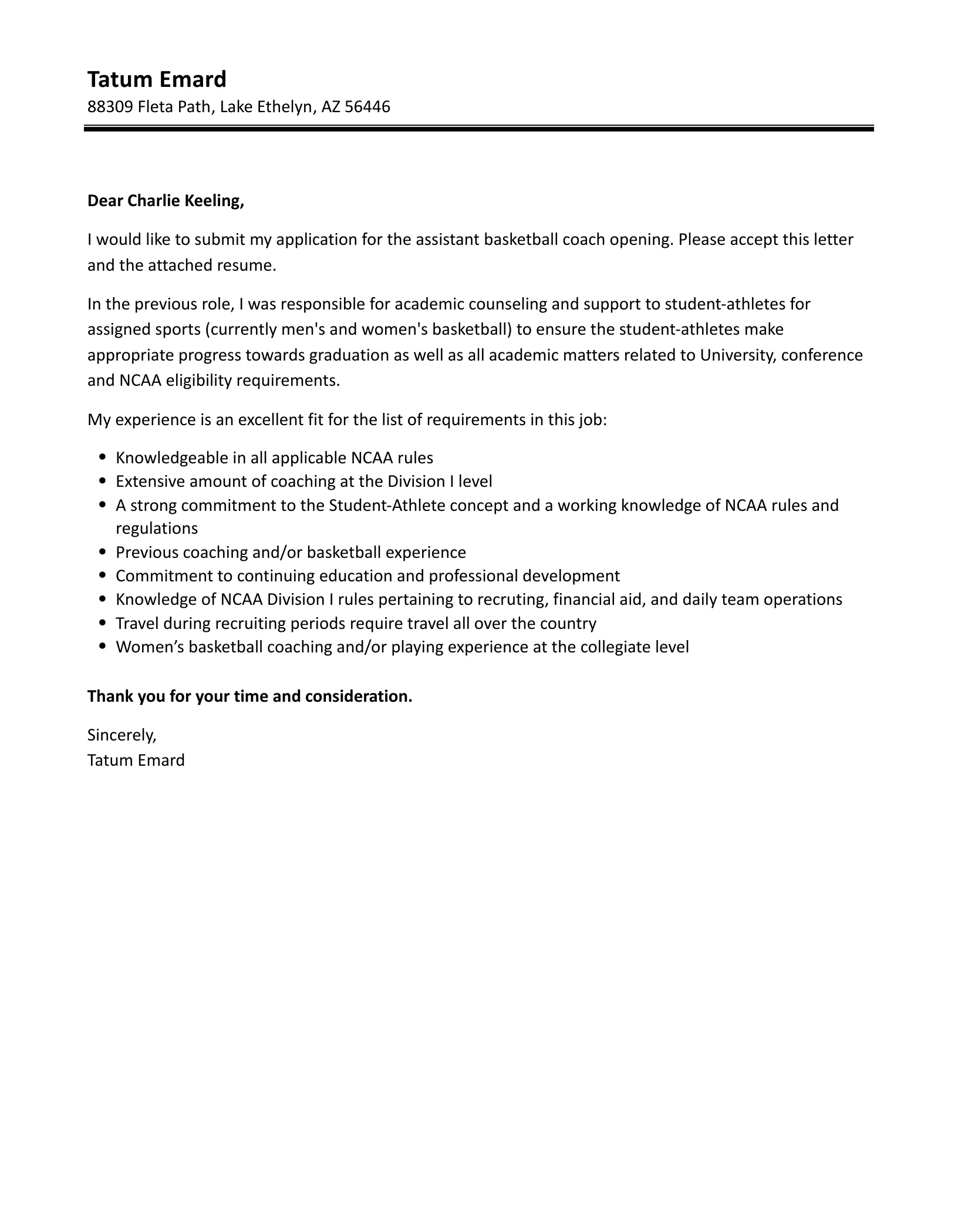
In the competitive world of coaching, a cover letter is a crucial tool for setting yourself apart. It allows you to go beyond simply listing your accomplishments and instead, demonstrate how your skills and experiences directly relate to the specific needs of the organization or team. A cover letter provides context, allowing you to explain any gaps in your employment history, highlight specific achievements, and express your enthusiasm for the role. Furthermore, a well-written letter shows that you’ve taken the time to research the organization and understand its values and goals. It allows you to tailor your application and showcase your understanding of the sport, the athletes, and the coaching philosophy. It’s an opportunity to establish a connection with the hiring manager before even stepping foot in the interview room, significantly increasing your chances of securing an interview and landing the coaching position.
Key Components of a Coach Cover Letter
A strong coach cover letter includes several essential components, each designed to highlight your suitability for the role and grab the reader’s attention. Structuring your letter effectively and incorporating the right information is key to presenting yourself in the best possible light. Each section should contribute to a cohesive narrative that showcases your coaching expertise and enthusiasm for the opportunity. By understanding these key components, you can craft a cover letter that is both informative and persuasive, ultimately helping you stand out from other applicants and securing your dream coaching role. Let’s break down the key components of a coach cover letter, ensuring you present a compelling and professional introduction to your application.
Contact Information & Salutation
Start your cover letter with your contact information (name, address, phone number, and email address) at the top. If possible, find the hiring manager’s name and address them directly. Using a specific name shows that you’ve done your research and demonstrates a personal approach. If the name isn’t available, use a professional salutation such as “Dear Hiring Manager” or “Dear [Team Name] Selection Committee.”
Highlighting Your Coaching Experience
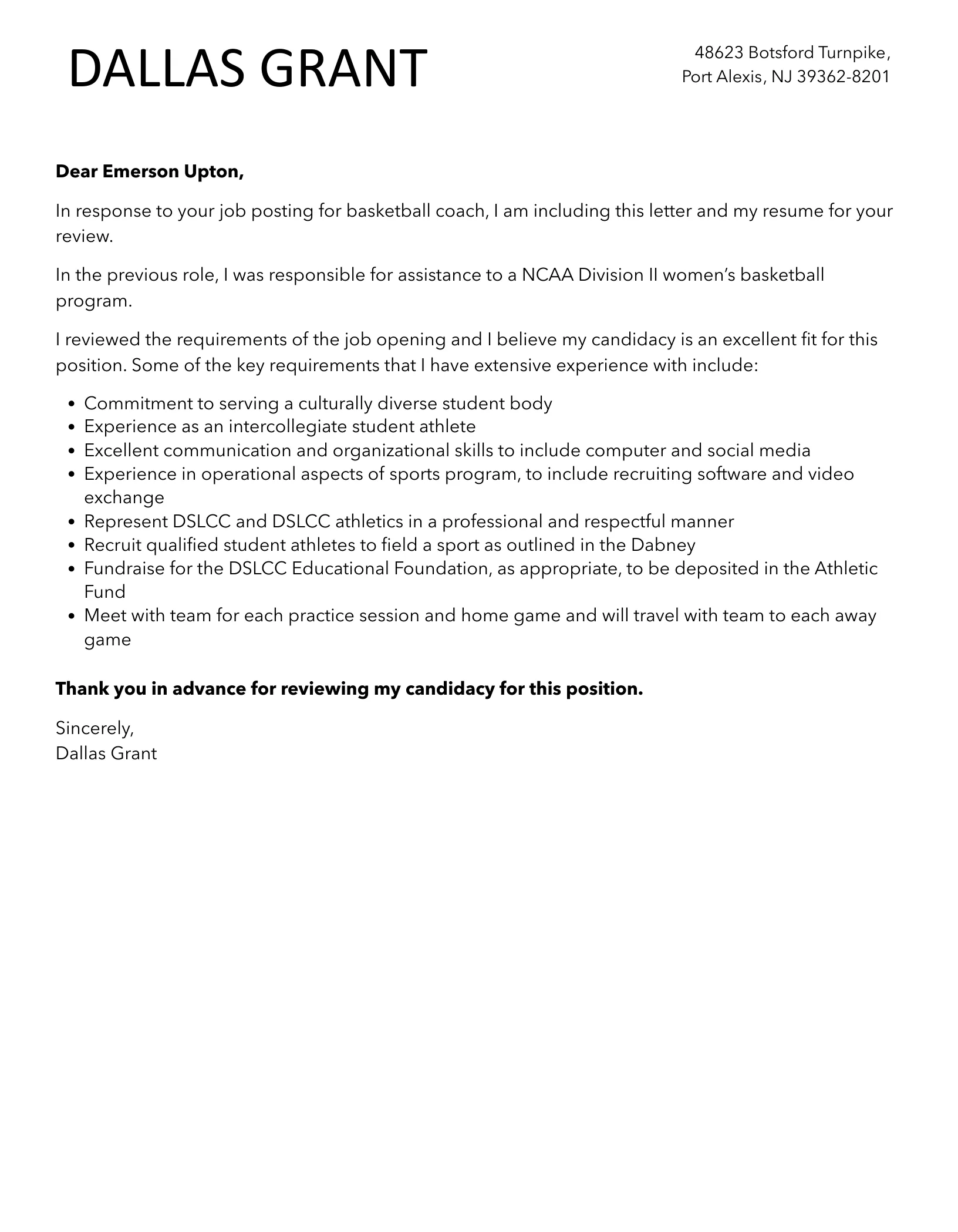
In the body of your letter, clearly outline your coaching experience. Mention the teams or organizations you’ve worked with, the sports you’ve coached, and the levels (e.g., youth, high school, college). Briefly describe your coaching philosophy and how it aligns with the values of the team or organization you’re applying to. Focus on your successes and demonstrate how your experience has prepared you for this specific role. Use action verbs to describe your responsibilities and achievements, and focus on highlighting the skills and experiences most relevant to the position.
Quantifying Your Achievements
Don’t just list your responsibilities, quantify your achievements. Use numbers and data to demonstrate your impact. For example, instead of saying “Improved team performance,” say “Increased team win percentage by 20% in one season.” This approach provides concrete evidence of your capabilities and gives the hiring manager a clear understanding of your track record. Quantifying achievements adds credibility to your application and helps you stand out from other candidates. Use measurable results whenever possible to showcase the value you bring to the team.
Showcasing Relevant Skills and Qualifications
Clearly identify the skills and qualifications that make you a strong candidate for the position. This might include your knowledge of the sport, your ability to develop training programs, your communication skills, your leadership abilities, and your experience in recruiting or player development. Tailor this section to match the requirements outlined in the job description. Highlight any certifications, licenses, or special skills that are relevant to the position. Showcase your ability to build rapport with players, create a positive team environment, and manage the day-to-day operations of a coaching program.
Demonstrating Your Passion and Fit
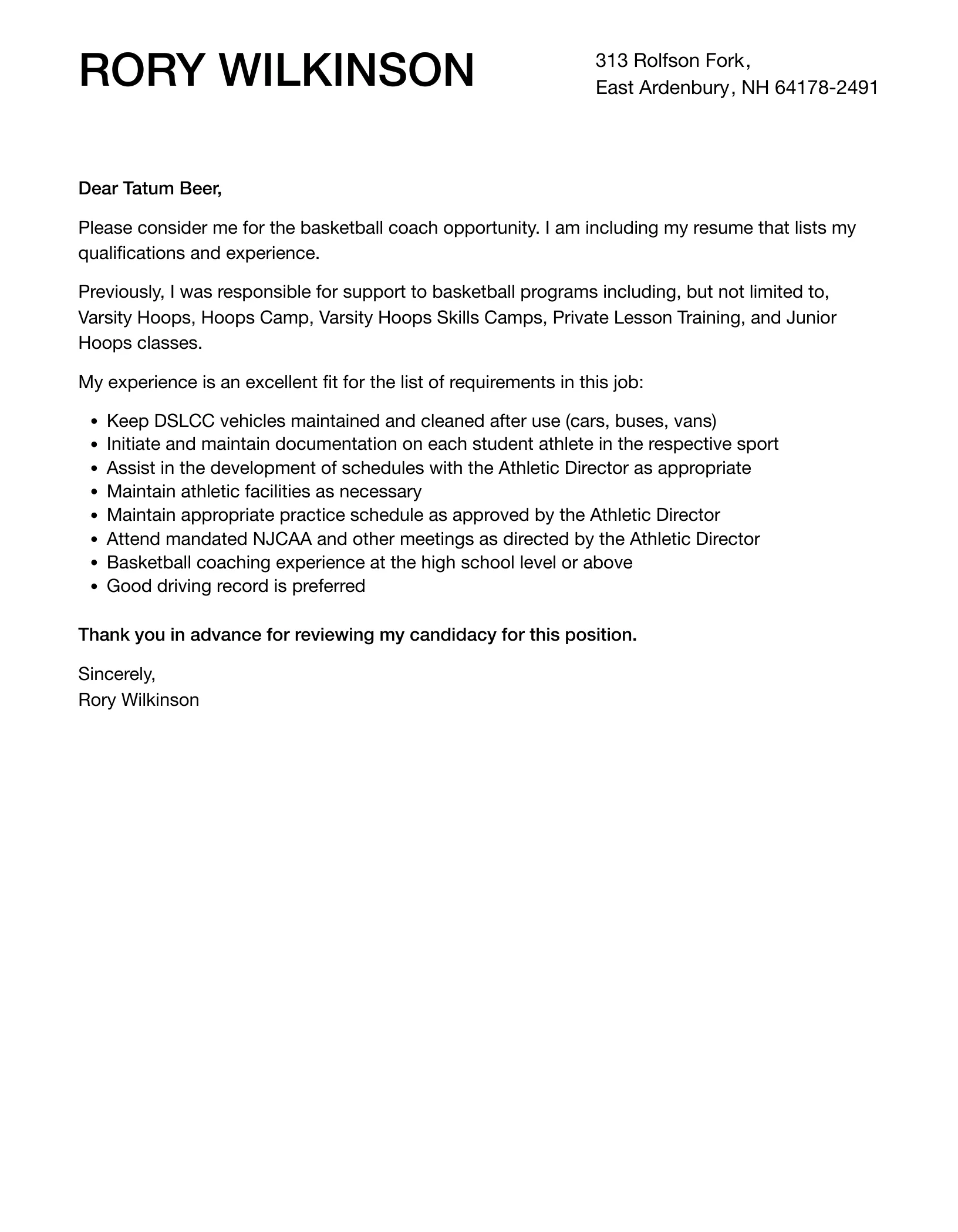
Express your passion for coaching and explain why you are interested in this particular role and organization. Show that you have researched the team, its values, and its goals. Explain how your coaching philosophy aligns with theirs and what you can contribute to their success. Demonstrating your genuine enthusiasm for the role helps establish a strong connection with the hiring manager and showcases your commitment to the organization. Talk about what motivates you to coach, what you enjoy most about the process, and how you plan to inspire and develop your athletes. The more you show your enthusiasm, the better your chances of getting the job.
Tailoring Your Letter to the Specific Role
Customize your cover letter for each coaching position you apply for. Avoid using a generic template. Research the team, the program, and the specific requirements of the job. Highlight the skills and experiences that are most relevant to this particular opportunity. Customize your letter to show how you will contribute to the team’s success. Review the job description carefully and use keywords from the posting to demonstrate that you understand the needs of the team. The more tailored your cover letter is, the better your chances of getting noticed.
Formatting and Structure
Maintain a professional and easy-to-read format. Use a clear font (e.g., Times New Roman, Arial) in a reasonable size (11 or 12 points). Use single spacing within paragraphs and double spacing between paragraphs. Keep the letter concise and to the point, ideally within one page. Divide the content into clear sections with headings and subheadings for easy readability. Proofread the letter carefully to eliminate any grammatical errors or typos. Ensure your cover letter is well-structured and visually appealing. A polished appearance demonstrates your attention to detail and professionalism.
Proofreading and Editing Your Cover Letter
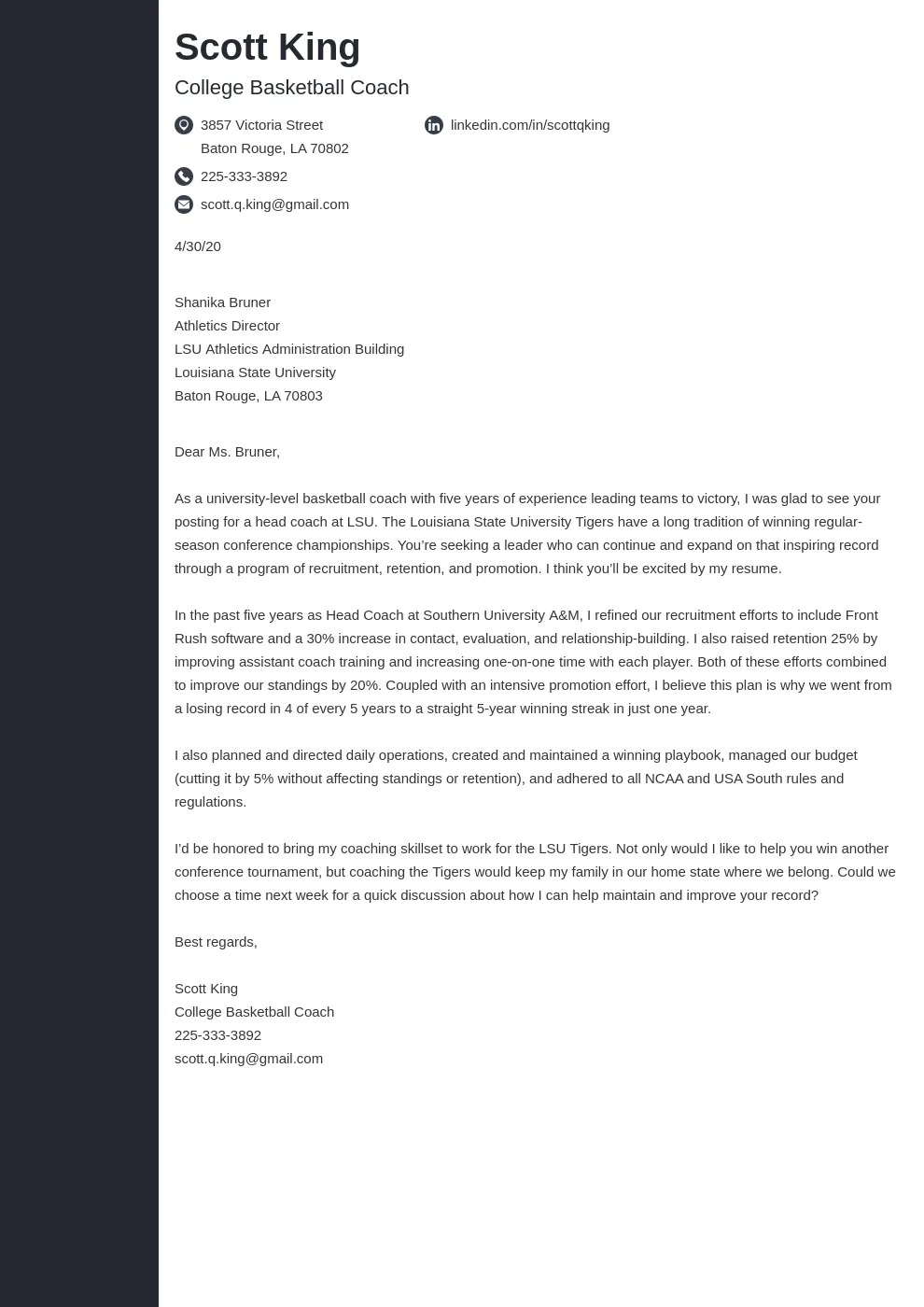
Before submitting your cover letter, carefully proofread and edit it. Check for any grammatical errors, typos, or formatting inconsistencies. Have a friend or colleague review your letter for clarity, accuracy, and overall effectiveness. Ensure your writing is clear, concise, and free of jargon. A well-proofread cover letter shows that you pay attention to detail and that you are a polished professional. Correct any errors, revise sentences for clarity, and ensure your writing is compelling and error-free. Consider using a grammar and spell-checking tool to catch any errors you may have missed.
Tips for Standing Out
To make your cover letter stand out, personalize it with a unique anecdote or experience that demonstrates your passion for coaching. Show your understanding of the team and its current challenges and goals. Highlight your key achievements and quantify your results whenever possible. Consider adding a short, compelling video introduction to accompany your application. Tailor your letter to the specific role, emphasizing skills and experiences that align with the job description. Demonstrate your commitment to athlete development, teamwork, and sportsmanship. Show that you’re not just a coach, but a leader who inspires success.
Common Mistakes to Avoid
Avoid generic cover letters that could apply to any job. Never use clichés or overly formal language. Don’t make spelling or grammatical errors. Do not focus solely on your needs and desires; instead, focus on how you can benefit the team or organization. Avoid being negative or making disparaging remarks about previous employers or teams. Do not go beyond one page. Make sure to tailor your letter for the specific job you are applying for. Failure to follow these simple rules can damage your chances of landing the job.
Example Coach Cover Letter
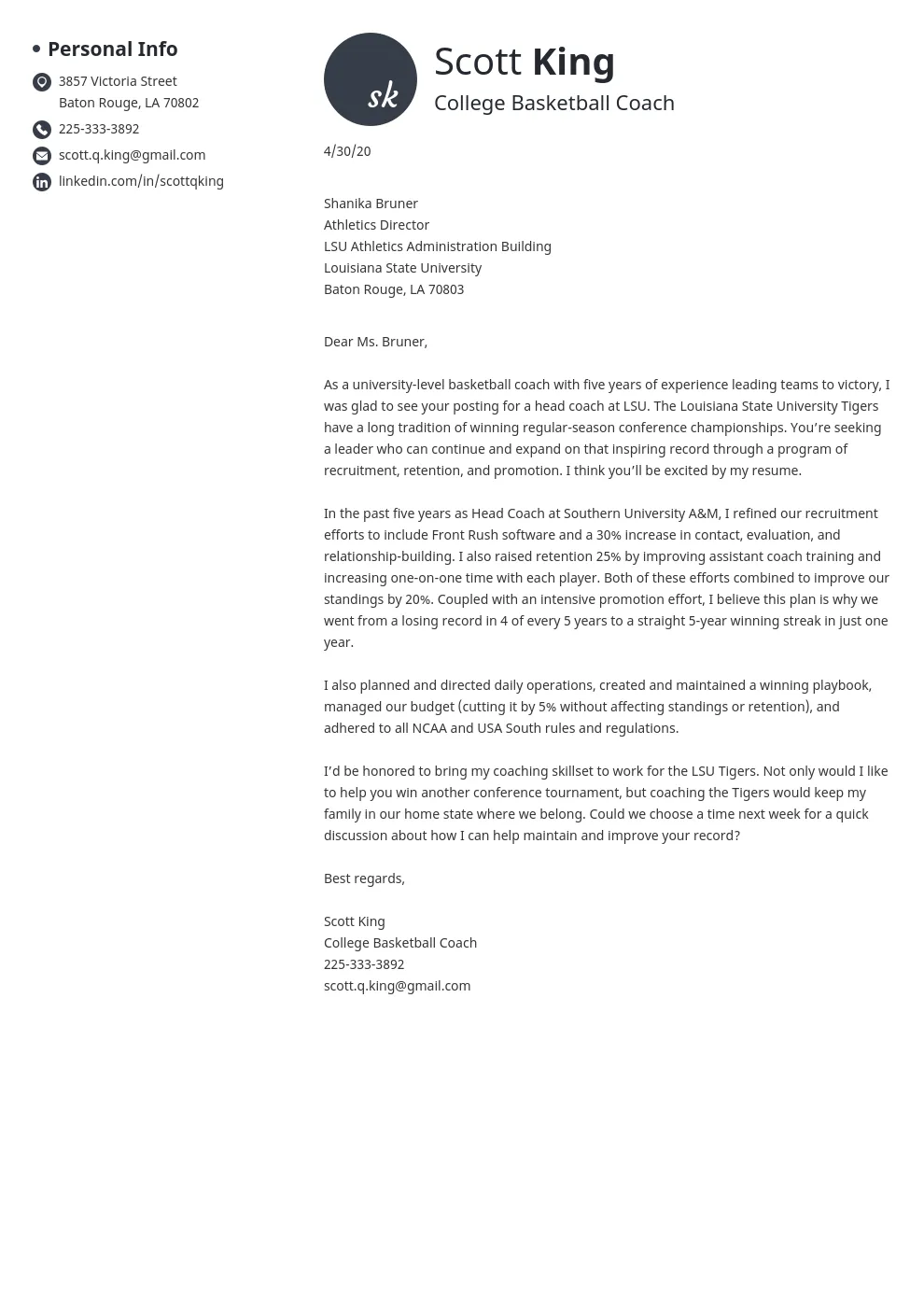
Here’s a sample coach cover letter to guide you. [Insert a well-formatted example of a cover letter here. The example should be tailored to a specific sport or coaching scenario, including relevant experience, skills, and a personalized message. Make sure the example incorporates the key components discussed earlier and is well-structured and professional. Keep the example realistic and relevant to various coaching positions. Note: Provide a separate, fully formatted example here.]
Conclusion
Crafting a compelling coach cover letter is a critical step in the job application process. By following these guidelines, you can effectively showcase your skills, experience, and passion for coaching, increasing your chances of securing an interview and landing your dream coaching position. Remember to tailor your letter to each specific role, highlight your achievements, and demonstrate your understanding of the team’s needs and goals. A well-written cover letter is your key to unlocking new opportunities in the exciting world of coaching. Good luck with your job search!
